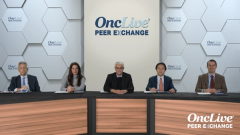
PI3K Inhibitors in Relapsed/Refractory Follicular Lymphoma
A review of the role of PI3K inhibitors in the treatment of follicular lymphoma, and how they have been used to improve patient outcomes.
Episodes in this series

Transcript:
Bijal D. Shah, MD, MS: Brian, I want to turn to you to ask another hard question and I feel bad, because I keep asking you these hard questions. I asked you a question earlier, how do we distinguish between the BTK [Bruton’s Tyrosine Kinase] inhibitors. I’m now going to ask you how do we distinguish the PI3K inhibitors?
Brian T. Hill, MD, PhD: Yes, that is challenging. I will say there are technically 4, as was mentioned; idelalisib, duvelisib, copanlisib, and umbralisib; 3 of these are actually oral and they have varying degrees of specificity for the various isoforms. The one that actually is a little bit more unique is copanlisib because it’s intravenously administered, and perhaps because of that, does seem to have lower rates of GI [gastrointestinal] toxicities, because immune-mediated colitis with profuse diarrhea is something that has been seen as a class effect of almost all of the orally available PI3 kinase inhibitors.
I think one of the things that we’ve seen over the development of these agents is that, most likely, investigators and clinicians have probably gotten better at managing and being on the lookout for the toxicities. That may be part of why we see lower grades with some of the newer agents. But the data with copanlisib is a little bit distinct; it has some other unique toxicities. It can cause hyperglycemia and hypertension during the infusion, and requires weekly doses. But, beyond that, I would say there are new dosing strategies that are being explored with some of the newer agents with intermittent dosing which likely are going to lead to better tolerability.
Bijal D. Shah, MD, MS: Great. Michael, let’s do a deep dive on copanlisib. What are your impressions of the phase 3 CHRONOS study?
Michael Wang, MD: Yes, the phase 3 CHRONOS study, headed by Dr Zinzani from Italy, is a phase 3 trial comparing copanlisib with rituximab, versus rituximab plus placebo. So far, this is really a very positive trial, showing that with the rituximab-copanlisib combination, there is a high response rate, a longer duration of response and survival. I’m hoping that the overall survival will be also different. Thus, this means that the rituximab with copanlisib is a very effective therapy.
Bijal D. Shah, MD, MS: I guess it also means now with the Revlimid-rituximab versus rituximab trial in the second line, and now the copanlisib plus rituximab versus rituximab in the third line, it tells us that Rituxan monotherapy is not necessarily our go-to anymore for relapsed disease.
Michael Wang, MD: Yes.
Bijal D. Shah, MD, MS: Though I will tell everyone rather, perhaps foolishly, I still use single-agent Rituxan in some patients, particularly those that come with a more indolent relapse, low-burden relapse. Whether or not that’s the right thing, I don’t know. I will leave it at that.
Transcript edited for clarity.





































